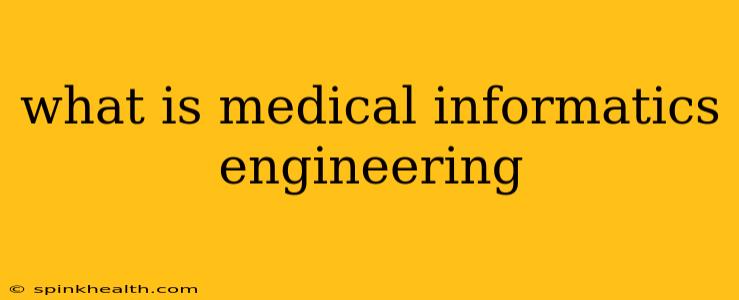What is Medical Informatics Engineering? A Journey into the Heart of Healthcare Technology
Imagine a world where doctors have instant access to a patient's complete medical history, seamlessly integrated with the latest research and treatment protocols. Where diagnostic tools leverage AI to detect diseases earlier and more accurately. This isn't science fiction; it's the promise of medical informatics engineering. It's a fascinating field blending the precision of engineering with the human-centered approach of medicine, creating innovative solutions to some of healthcare's biggest challenges.
Medical informatics engineering isn't just about building websites or apps for doctors; it's about fundamentally reshaping how healthcare is delivered and experienced. It's a dynamic field that sits at the intersection of computer science, engineering, and medicine, focusing on the design, development, and implementation of technology to improve healthcare processes. Think of it as the bridge connecting the vast ocean of medical data with the practical needs of patients and practitioners.
What are the key roles of a Medical Informatics Engineer?
A medical informatics engineer's role is multifaceted and constantly evolving. They are the architects of healthcare's digital future, responsible for:
- Designing and developing health information systems: This includes electronic health records (EHRs), patient portals, and other systems designed to manage and share patient data securely and efficiently.
- Creating and implementing data analytics solutions: Sifting through mountains of patient data to identify trends, improve diagnoses, personalize treatments, and enhance overall healthcare outcomes.
- Developing clinical decision support systems: Building tools that provide clinicians with evidence-based recommendations, helping them make informed choices in real time.
- Integrating various healthcare technologies: Connecting different systems and devices (like wearables, imaging equipment, and lab instruments) to create a holistic and interoperable healthcare ecosystem.
- Ensuring data security and privacy: Implementing robust systems to protect sensitive patient information from unauthorized access and breaches.
- Improving the usability of healthcare technology: Designing systems that are intuitive and easy to use for both clinicians and patients, thereby fostering adoption and improving overall effectiveness.
What types of problems do Medical Informatics Engineers solve?
The challenges tackled by medical informatics engineers are diverse and far-reaching, impacting various aspects of healthcare:
- Improving patient safety: Developing systems that reduce medical errors and improve the accuracy of diagnoses and treatments.
- Reducing healthcare costs: Optimizing healthcare processes, enhancing efficiency, and preventing unnecessary hospital readmissions.
- Improving patient access to care: Expanding access to healthcare services, particularly for underserved populations, through telemedicine and other remote care solutions.
- Accelerating medical research: Developing tools to analyze large datasets and discover new insights that lead to breakthroughs in medical research.
- Personalizing patient care: Utilizing data analysis to tailor treatments to individual patient needs and preferences, leading to improved outcomes and patient satisfaction.
What skills are needed to become a Medical Informatics Engineer?
This field requires a unique blend of technical and soft skills:
- Strong programming skills: Proficiency in languages like Python, Java, or SQL is crucial for data analysis and system development.
- Data analysis and visualization skills: The ability to extract meaningful insights from large datasets and present them clearly.
- Knowledge of healthcare systems and regulations: A deep understanding of HIPAA, EHR systems, and clinical workflows is essential.
- Problem-solving and analytical skills: The ability to identify and solve complex problems using a systematic approach.
- Communication and collaboration skills: Working effectively with clinicians, researchers, and other engineers is key to successful project implementation.
Is Medical Informatics Engineering a good career path?
The field of medical informatics engineering is experiencing rapid growth, driven by the increasing adoption of technology in healthcare and the explosion of medical data. The demand for skilled professionals is high, offering excellent career prospects with opportunities for innovation and impactful contributions to society. If you're passionate about technology and dedicated to improving healthcare, medical informatics engineering could be an exceptionally rewarding career path.
This is a field that constantly evolves, and the future holds even more exciting possibilities, driven by advancements in AI, machine learning, and the Internet of Medical Things (IoMT). The journey into the heart of medical informatics engineering is a journey into the future of healthcare itself.

